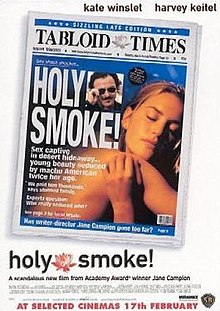Directed by: Jane Campion
Written by: Jane Campion, Anna Campion
Produced by: Jan Chapman
Other cast: Harvey Keitel, Julie Hamilton, Tim Robertson, Sophie Lee, Daniel Wyllie, Pam Grier
Release date: September 4, 1999
Genre: Comedy, Dram
Running time: 115 minutes
While on a journey of discovery in exotic India, beautiful young Ruth Barron falls under the influence of a charismatic religious guru. Her desperate parents then hire P.J. Waters, a macho cult de-programmer who confronts Ruth in a remote desert hideaway. But P.J. quickly learns that he's met his match in the sexy, intelligent, and iron-willed Ruth.
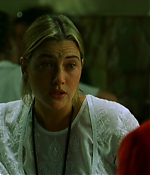
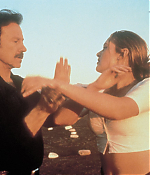
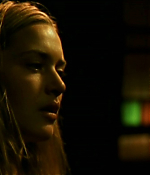
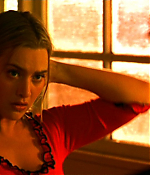
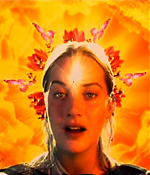
Taglines:
Trivia:
Ruth (Kate Winslet) lives in Sans Souci, Sydney, Australia. “Sans Souci” is French for “carefree”.
Director Jane Campion invited her sister, fellow writer and filmmaker Anna Campion (Loaded, 1994) to collaborate on the screenplay and then the 1999 novel. She said: “I’ve always collaborated with people whose work I’ve admired, but who above all think in ways I don’t. Anna, for instance, though I know her very well, is still a completely original creature to me.”
In scripting the battle that rages between Ruth (Kate Winslet) and P.J. (Harvey Keitel) in the film in their isolated desert hut, co-screenwriters Jane Campion and Anna Campion underscored P.J.’s deconstruction of Ruth’s belief system, with the politics of sex, gender and power. If P.J. intended his and Ruth’s to be a Socratic dialogue, the Campion sisters were intent on dragging the, in many ways, unreconstructed seventies man, into the nineties. The young, formidably articulate, at times savage, Ruth was to be P.J.’s avenging angel.
A critic called the film “Kate Winslet’s sexiest film since Titanic”.
Co-screenwriter Anna Campion said of this film’s writing: “When we first began, we used to sit in coffee bars and argue, almost like the two main characters Ruth [Kate Winslet] and P.J. [Harvey Keitel]. Our arguments in the first draft were the usual unprovable business…Is there a God, is there not a God?. Whether God is merely a projection of human need. The right of one to believe. We were working out the parameters of these inexhaustible arguments about the meaning of life and how the different characters might express them. P.J., in particular, has really thought these arguments through, which is extremely threatening for Ruth whose spiritual experience is emotional, not intellectual.”
Anna Campion, the film’s co-screenwriter, said of this movie: “Despite what many would say is an enormous revolution within one generation, there’s still a lot of misogyny out there. There’s still a large proportion of people trying to hold onto the idea of women being a backdrop for society. and some nervousness from women as a result, a sense of ‘we have to be careful all the time because otherwise we’re perceived as threatening. That’s something we wanted to address. We wanted Ruth [Kate Winslet] to be bold and not to care for P.J. [Harvey Keitel]’s good opinion.”
Director and co-writer Jane Campion said of the central Ruth character played by Kate Winslet: “Ruth is beautiful and intelligent, she’s also young. That was our real point of entry for the character. I believe youth tends to make people, it made me anyway, very dogmatic, and very brave. Young people keep us honest, they’re so intolerant of anything hypocritical. You hear it from kids all the time, the one thing they can’t tolerate is hypocrisy, which also gives them problems with the contradictory or paradoxical nature of life; anything that has a kind of overlapping or complex quality to it.”
Both actress Kate Winslet and director Jane Campion won the Elvira Notari Prize for this film at the Venice Film Festival in 1999.
The film was nominated for the Golden Lion Award at the Venice Film Festival in 1999 but lost to Zhang Yimou’s Not One Less (1999).
The film could have ended with Ruth (Kate Winslet) being pregnant with P.J.’s (Harvey Keitel’s) baby.
The thirteen week shoot began with a six week shoot based out of the South Australian country town of Hawker in the beautiful Flinders Ranges which had a population at the time of around 800.
Kate Winslet has stated in interviews that working on this film led to a humorous incident where Harvey Keitel wanted to improvise to create more intimacy between their two characters. Keitel proceeded to get on the floor and act like a dog, asking Winslet to be his owner who was helping him to die. Winslet initially took it as a joke, but once she realized Keitel was serious she carried on with it just as he asked.
According to an interview following the shoot, Kate Winslet admitted that in the urination scene, there was bag taped to her leg to pull off the effect. Finally, she got frustrated and asked co-writer and director Jane Campion if she could just urinate herself. Campion did one take this way, but the urine was harder to control than Winslet had thought, and the take was scrapped.
On a fellow actor’s advice, Kate Winslet drank three vodka and tonics for a scene involving her being drunk.
Character Quotes:
“Ha! Ladies! You wouldn’t know any. I bet you date little Barbie dolls, don’t you? “Oh, you’re so brainy, you’re so big! Can I suck your dick?” Can I be alone now?”
“I wasn’t born!”
“Ok tampax tool, I’m gonna give it to you right up your arse. All this “man-hating” shit for a start. “Oh she criticised me, I’ll call her a man hater!” I know what you want from me, you just want a youthful pussy transfusion, preferably one you can take home to show the men folk what a beautiful post you got to piss on. Jeans pressed, cowboy boots… is that a uniform for individuals, is it? I want a young man.”
